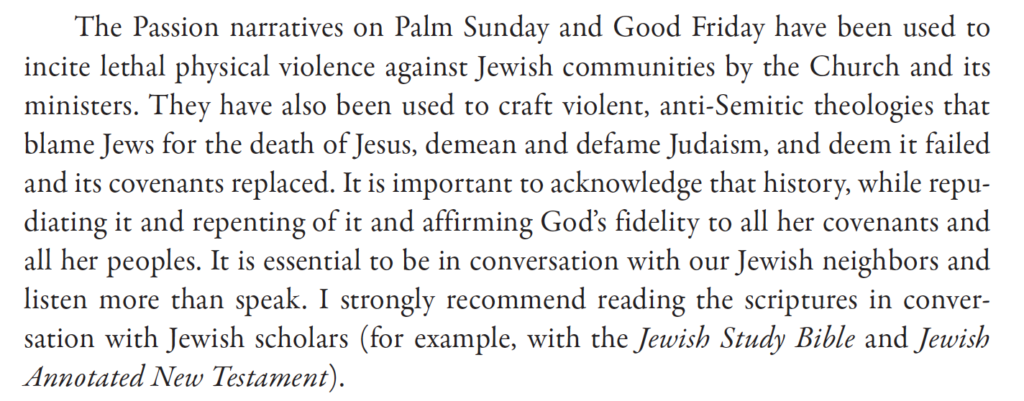Walking the Way: What is this strange thing that we do, walking around our churches and neighborhoods, waving palms from trees that are not native to where we are waiving them (for most of us), accompanied by choirs, the rare few with young acolytes on the backs of donkeys? Is it a living gospel? Is it good news? Good news for whom? There is a cluelessness in Palm Sunday. Everyone has come out to see a show but no one knows what kind of show it will be. It is a fun day and should be, especially for children. But for the adults who had their fingers on the political polls of the world, there would’ve been incredible tension and concern.
The Prophets Isaiah: The beauty and power of the gospel story does not require hijacking the Hebrew Scriptures even when our New Testament ancestors read them through their experience and understanding of the Jesus story. Scripture is a living word that speaks across time in, to and through multiple contexts without ever losing its original contextual meaning. Many lectionaries will turn to the Servant Songs, poem-prayer-prophecies, that speak of Israel’s longing to be restored to their former glory set at different moments in their history by different individuals and communities writing as Isaiah ben Amos. These are messianic texts with a diversity of messianic figures. In some of the nation is the servant, or really slave in keeping with the language the text actually uses. In others the focus is on a single figure who will restore the monarchy, a descendent of David who will take the throne in their time or soon after and establish a functioning government. In some of the songs the figure is disfigured, badly abused, representing the destruction of the monarchy and the suffering of the people. What they are not is simplistic reductive predictions of Jesus and his suffering. As scripture, these texts speak to the people to and for whom they were spoken and recorded, a timely word in their time and, they also speak to those who read and hear them after their time, without negating any of their original and contextual meanings.
Pain and Passion: Christians have short inconvenient memories. Jews cannot afford the luxury. Christians forget and -dis-remember the reading of the passion gospel in our church is on Palm Sunday being used to launch atrocities against Jews in and near our communities, savage destruction, burning of Torahs and Talmuds and other sacred literature, murders and beatings, vandalism and ransacking thefts. Our memories are conveniently short. Some of us have continued to use a gospel reading that heaps blood libel upon the heads of Jews even when they, our neighbors, our kin created in the same image of the same God, have asked us not to, reminding us of the harm it still does and most have closed their ears. Some have added a footnote to their bulletins as though that would dampen the sound of the voices proclaiming the blood of Jesus is upon the Jews in unison. As we do not often preach on Palm Sunday, the words of the gospel speak for us so it matters what gospel we choose to read.
A Women’s Lectionary for the Whole Church: In in this lectionary, we do not read the crucifixion account from the Gospel of John. We use Mark for Palm Sunday (there’s an error in the commentary discussion) and Luke for Good Friday. The quote below can be found in each volume and will be in those that follow.


Vincent Dsouza
April 25, 2022 8:33 amDear Wil,
I came across by chance on the YouTube where you talk about your Missal. This was the year where I discovered Zagano the great feminist. Now you. I believe I will have a lot to learn from you.
In my personal life, I am struggling to experience the Creator as Feminine Goddess. I have read The Great Mother by Erich Neumann. I feel blessed to have tripped on your video. I belive, that I am on this sacred journey to encounter the Feminine Goddess.
I am Vincent Dsouza sj a Jesuit Priest working in a tribal area in Maharashtra.
Yours faithfully,
Vincy